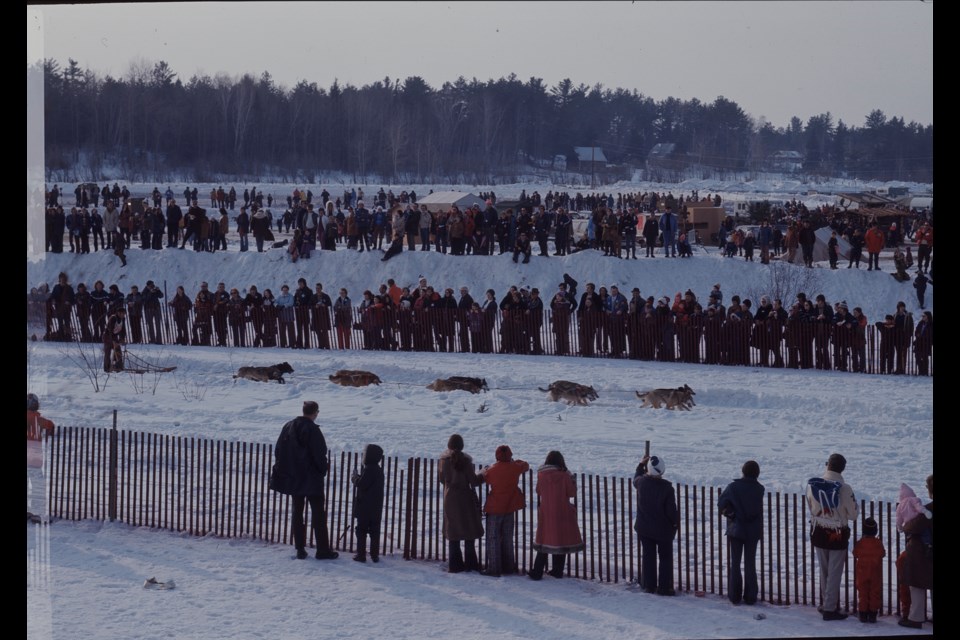From commemorating the origins of the City of North Bay to national holidays and seasonal festivals and events, North Bay has a long legacy of civic celebrations.
While putting together an exhibit centred around the history of celebrations in North Bay, museum staff were struck by both the importance of these celebrations and the way each past event relied heavily on community volunteerism and support.
This article provides a brief look at some of North Bay’s most well known festivals and events. For a more in depth look, the North Bay Museum invites visitors to look at the North Bay Celebrates online exhibit. A physical exhibit is also available at the North Bay Museum (check the museum's website for more information to plan your visit).
Winter Festivals
Considering North Bay’s climate, it is not surprising that many local events and festivals take place in the winter.
North Bay’s first major winter event was the North Bay Snow Frolic. The event launched in 1946 with the slogan “Snow Fun is Good Fun Come to North Bay, Ont., Often!”.
Event activities included musical entertainment, ice climbing, a Snow Princess contest, a beard judging contest, ski events, fireworks, parades, wood chopping, an air show, and speed skating. Displays and ice towers were also set up along Main Street.
The North Bay Winter Fur Carnival launched in 1966 and ran each winter until 1977 (when the event was discontinued due to financial losses). The carnival activities included snowmobile races, an automobile ice race, a dog sled weight pulling contest, a sled dog derby, a Winter Carnival Fur Queen contest, a figure skating show, and skydivers. A song by Bill Vrebosch entitled “Duke the Toque” was also performed.
A few years later, in 1983, the North Bay Winter Carnival was launched. The Winter Carnival included a Carnival Queen pageant, air shows, snowmobile races, log sawing contests, bike races, figure skating, food stands by local service clubs, and more. In July 1995, The North Bay Winter Carnival organizing committee announced the 12 year event would cease due to lack of local support
Le Carnaval des Compagnons takes place in North Bay each winter. Inspired by the first official Quebec carnival held in 1953, a small group of local Francophones decided to bring a similar event to their hometown in 1963. Since then, North Bay’s Francophone population has been gathering every February for a week of snowy activities.
These activities include outdoor games, community breakfasts, and live performances to bring together the entire Francophone community in a celebration of the French language and heritage.
The highlight of Carnaval is the unveiling of Bonhomme Carnaval, the shining mascot who appears at various activities throughout the week.
North Bay Heritage Festival
The North Bay Heritage Festival was first held in 1986.
In the 1980’s North Bay held a “Mayor’s Kiddies Day” in the summer. In 1986, the Ministry of Municipal Affairs presented the Heritage Village Concept to the City of North Bay for Consideration as a way to expand on the existing event. The City of North Bay passed a Resolution, approving the hosting of the first Gateway Heritage Festival and appointed a committee to plan the event.
After only three months of planning, over 10, 000 people turned out for the First Annual Gateway Heritage Festival in 1986.
The festival was promoted as a community based, family oriented event that featured something for everyone. The festival grew to include an international airshow, pro beach volleyball, a firefighter combat challenge, musical entertainment and parades, and a heritage village highlighting components of North Bay’s heritage.
In 1994, the festival name was changed to the North Bay Heritage Festival & Airshow with a shift in focus to move towards tourism development. The 2005 Heritage Festival welcomed 23, 362 paid attendees.
In 2007, the festival plan was scaled back after it turned out that the headliner (Meatloaf) was not actually booked to play in North Bay. Soon after, the festival was rebranded ‘Summer in the Park’. The Summer in the Park festival ran until 2018. Beginning in 2019, city funding was created to support several local, grassroots festivals rather than one large summer festival.
